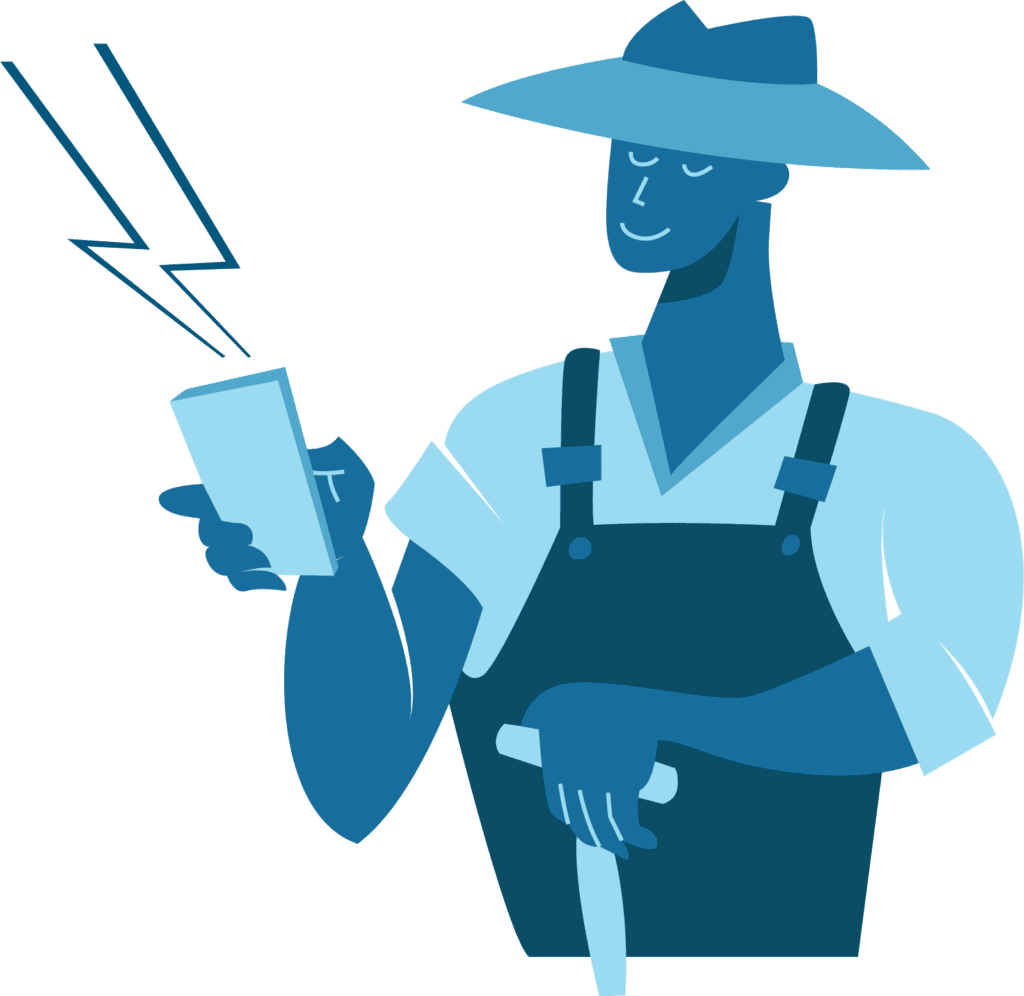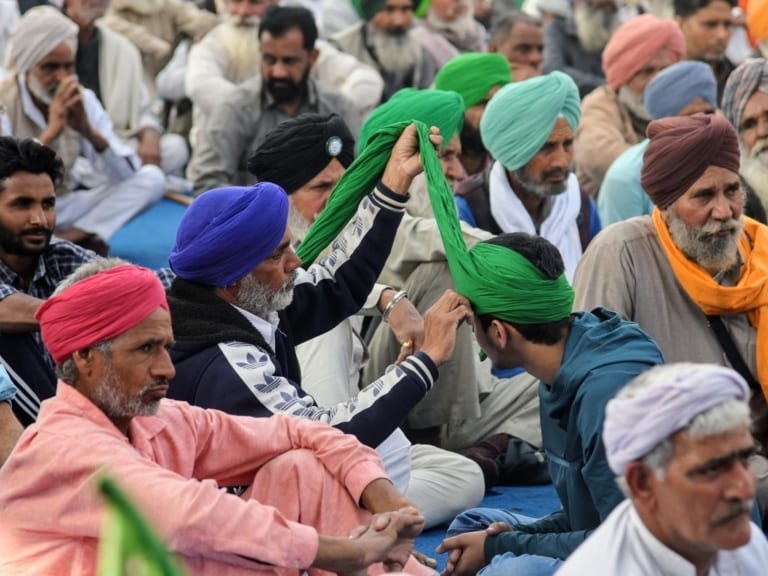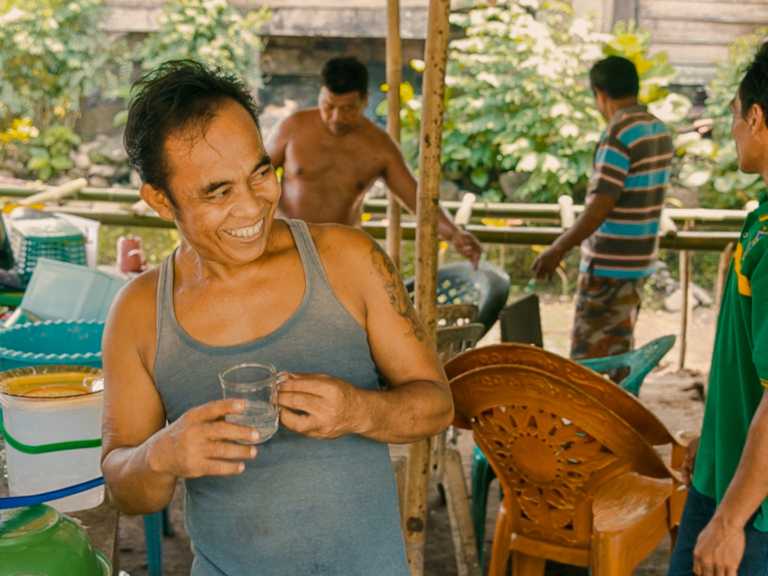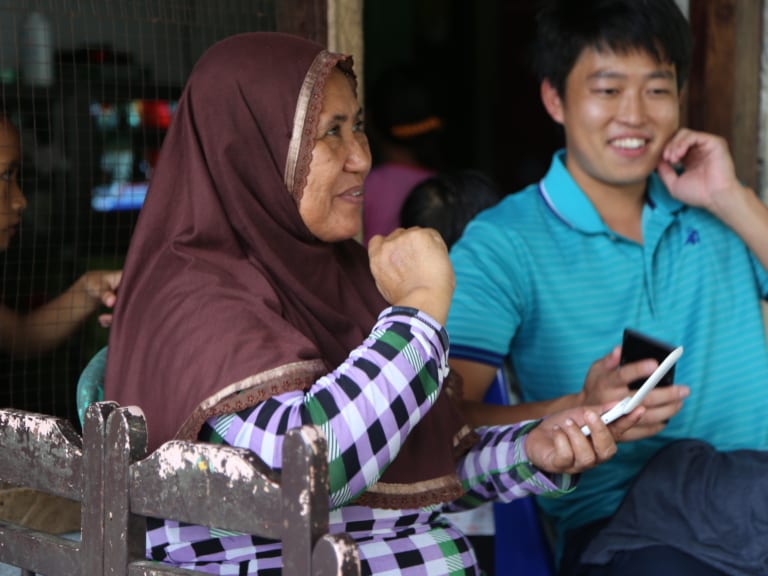This chapter holds all the work we did in 2021. From the tools and platforms we developed and form the very foundation of everything we do, to the sharing of knowledge and the projects we did with companies like Trabocca and Verstegen Spices & Sauces.
TOOLS AND PLATFORMS
TRACE
By now you know all about our platform Trace. How it works, in short: agri-food companies trace their products and tell a transparent product story; farmers become more involved supply chain actors; consumers learn all about the story behind their food. (If you want to learn more, we can recommend the webinar where we launched Trace.) 2021 is the year we further developed this tool. One of the questions we asked ourselves this time around was: how do we keep farmers in remote areas, where Internet access is scarce, in the innovation loop? The answer came in the form of our brand new Fairfood Farmer Cards.
Using the same technology we use when shopping with our debit card or entering a building using an entrance pass, the “Near Field Communication” – or NFC cards – allow farmers to interact with Trace even in regions where Internet access and smartphone usage is limited. During each transaction – say, a farmer sells a bag of coffee – the farmer’s personal NFC card is scanned, and the transaction goes straight into the blockchain system where the farmer builds up a transaction archive. This way farmers are included in the product stories and all stakeholders can verify the prices paid. We are excited to share that at this moment, almost 400 cards are being used by Indonesian nutmeg suppliers.
Some other exciting numbers on the evolution of Trace in 2021:
organisations and companies now have an account on Trace
We connected over
farmers to Trace
PROCESS AS A SERVICE
Going transparent may sound slightly daunting. Maybe, at this stage, you don’t even know who the farmers who are growing your products are. How, then, do you get to the point where you can tell a transparent story that involves, or even revolves around them? To alleviate difficulties like these, we standardised the transparency journey for companies in 2021. Every project starts at the drawing board, and isn’t kicked-off until we have given shape to these four stages:
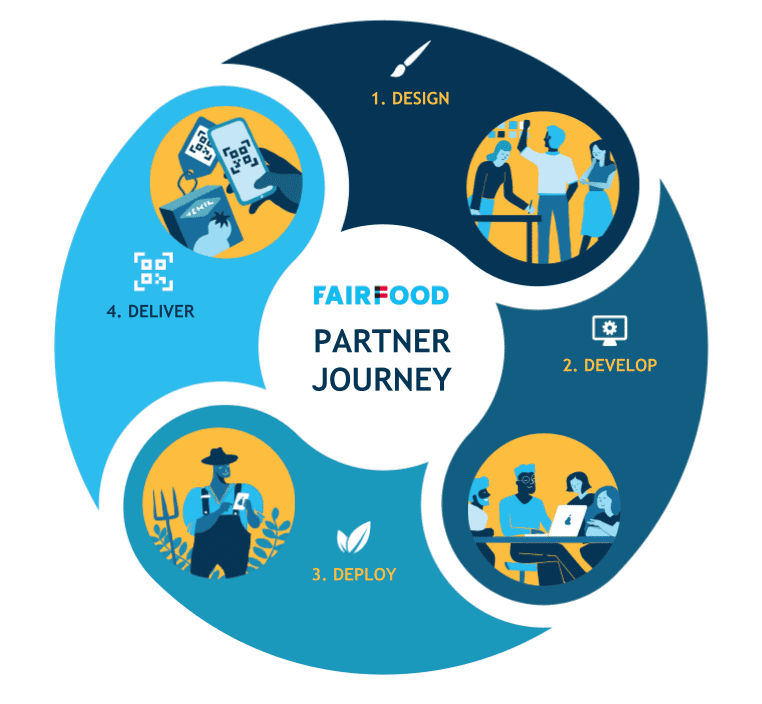
- Design: We work closely with companies to set the project scope and ideation product launch. As food value chains commonly include different issues, a risk assessment is conducted during the design phase. This helps define priorities and decide the best way to achieve set goals. Child labour? Gender inequality? Bad working conditions? Maybe all of them are rooted in low incomes, so what do we do?
- Develop: The second stage is all about developing the product claims we will be working on – say, ‘quality premium paid’ or ‘100% traceable coffee’. Next, we align the programme management with the tech team to coordinate the process from data collection to product launch
- Deploy: This is where the magic happens! Deploying a traceability project involves training and onboarding all actors involved, for example – from farmers to collectors and buyers. This stage often involves coordinating field trainings and continuous data input
- Deliver: With an impact report in hand, now we hand things back over to the partner, both literally and conceptually speaking. The product is ready to be launched! If you wish, this stage involves a solid communication plan that builds on the findings now available in your open ledger, so you can share your product’s story step by step. Or should we say… block by block?
THE LIVING WAGE & INCOME LAB
The pandemic forced us to postpone many of the conversations we would like to have had in person. This was hardest on our Living Wage & Income Lab, whichwas created as a space to connect companies, legislators and civil society organisations looking for innovative solutions to the problem of low pay in supply chains. Since the pandemic didn’t seem to be going anywhere, we decided to revamp the Lab, and temporarily move it to an online environment. On the plus side: people from over 20 countries, including Chile, the Netherlands, Belgium, Uganda, Kenya and the United States, could join the conversations we had with Tony’s Chocolonely, Fairtrade International and others. In 2022, expect new sessions and lots of co-creation!
ALIGN
Tailor-made with input from the Living Wage & Income Lab participants, ALIGN guides agri-food companies through the process of implementing a living wage or income strategy. After developing an Action Process, Source Map, and Resource Library, we published a powerful document in 2021 that allows ALIGN users to get a quick overview of income and wage situations in different parts of the world. ALIGN partners Global Living Wage Coalition and Living Income Community of Practice put in the hard work, figuring out how high a living wage or income is exactly in 42 countries across the globe. We put all the data into an easy-to-use file, so you can look up what the people behind your products should be earning. Free download, at your disposal!
Some more ALIGN highlights from 2021:
ALIGN is now supported by
partners: Fairfood, GIZ, Rainforest Alliance, Living Income Community Of Practice, and Global Living Wage Coalition
ALIGN was listed on the United Nations’ Global Compact platform: Decent Work in Global Supply Chains Action, which highlights lessons learnt and best practices from companies and organisations who tackle low pay in supply chains, and provides guidelines for companies to improve wages
is the number of people who are now reading our brand-new ALIGN newsletter
More than
new users visited the ALIGN website
SHARING KNOWLEDGE
As we work to democratise access to new technologies and digital solutions, we use our platforms and channels to elevate the discussion of topics that are at the very core of our work. Through webinars and articles, as well as presentations and reports published together with different partners, we use our ‘knowledge hub’ to explore new developments, solutions and business models that can help improve the lives of the people behind our food.
Some highlights:
We gave 7 big industry presentations. Including a presentation and training for Dutch government officials at The Fork and presentations at the Sustainable Coffee Challenge, which counts companies like Jacob Douwe Egberts, Nescafé, and Starbucks as active members
We joined several multi-stakeholder platforms, including MVO Platform (the Dutch Responsible Business Conduct Platform), the Sustainable Coffee Challenge, and the Dutch Initiative on Sustainable Cocoa (DISCO)
We published 28 articles on transparency, traceability, living wage and income, and mandatory due diligence
We organised 3 webinars on the topics of transparency, traceability and fair value distribution
Over 2.200 people are reading our Fairfood newsletter, which on average is being opened by 35%
More than
new users found their way to the Fairfood website
In 2021, the focus on our platforms was on three main themes:
FAIR VALUE DISTRIBUTION
By now we all know that the people at the very beginning of food production chains are notoriously underpaid, whereas at the other end of the chain, big food companies take home the profit. Is there a way to reshape and improve these food supply chains? We explored this question during several Trace Talks webinar. With the help of coffee importer Trabocca, Simon Lévelt, and Social Vanilla, we demonstrated how Trace supports companies in the exploration of alternative arrangements after getting more clarity on their chains. Drawing lessons from great examples, we also looked at how others are working to distribute value more fairly with the help of Tesco, Social Vanilla, and Kumasi Drinks.
MANDATORY DUE DILIGENCE
2021 was an important year for everyone pushing the agenda for mandatory due diligence. Responsible business conduct legislation found its way not only onto states-member agendas at a European level, but at a national level in The Netherlands too. For all proponents, this made voicing what’s critical for this law to positively impact the life of farmers and farmworkers extra urgent.
Joining forces with like-minded organisations, we developed recommendations, guidelines and articles to maintain momentum and voice our ideas of what efficient laws should look like if we want to hold companies accountable for what’s going on in their supply chains. IDVO is an initiative we joined that is especially worth mentioning. This public-private partnership pushes for legislation for corporate social responsibility, focused specifically on the Netherlands.
At an EU level, our advocacy focused on recommendations for legislation that includes smallholder farmers, who are still underrepresented in global supply chains. Together with 13 other organisations, we published the paper Legislating for Impact, which highlighted the importance of living income and wage strategies, responsible purchasing practices, and long-term commitments in negotiation.
Check out the best blogs of 2021:
“Information is power, and I can see asymmetries in how and by whom data is gathered, and who benefits from that. As we are starting on this legislation and in the face of the many abuses in value chains, transparency is needed for companies if they want to make serious work of human rights due diligence.” – From our interview with Dutch Member of the European Parliament Lara Wolters
We published quite a few in-depth articles on the topic too. Hoping to find out why EU legislation on responsible business conduct was delayed twice, we talked to Dutch Member of Parliament (MEP) Lara Wolters, who led the Parliament report that, as of the writing of this annual report, is being discussed by the European Commission. Contrary to what many believe, she highlighted the proactivity and support coming from companies that seek clear guidelines when it comes to sustainable practices. The MEP pointed out that with the increase in resources facilitating transparency, greater accountability is the natural path.
FAIR TECH AND DATA
A technological revolution is shaping the future of the agri-food sector. The thing new solutions dedicated to connecting, optimising and financing global supply chains have in common, is granular data, which links all parts of the chain and allows them to function remotely. But can we make sure that we are fully exploiting the inclusive potential of technology and underlying data to transform our food system?
We investigated this subject not only in numerous articles, newsletters, and presentations, but also looked at innovative ways to break away from business as usual in our webinar Fostering inclusive value chains by closing the tech gap. The talk focused on data-driven solutions, enabling companies to address key challenges that prevent us from making global supply chains not only more productive and sustainable, but also more inclusive.
“Data collection has the potential of becoming a fairer and more inclusive practice if we make farmers aware of not only how data can benefit them, but also of the inherent value of their data and how it can become an additional product they produce.” – From our blog 3 Challenges in the Digital Era
PROGRAMMES AND PROJECTS
RECLAIM SUSTAINABILITY!
In 2020, we kicked-off the RECLAIM Sustainability! programme, together with partners Solidaridad and the Dutch Ministry of Foreign Affairs, among others. Together, we strive to foster genuine and inclusive sustainability in global value chains, in which the voices of farmers, miners, workers and citizens are well represented in decision-making, strengthening civil society.
After an intensive design phase, it was finally time in 2021 to kick off three pilot projects, and take another step towards proving the business case of transparency in global value chains. New on Fairfood’s menu: chocolate! We are now tracing cocoa beans from Sierra Leone, adding to our proud work on traceable coffee from Honduras and Uganda.
As an innovation lead in the RECLAIM Sustainability! consortium, our pilots investigate the added value of transparency for farmers. Together with traders and buyers, local Civil Society Organisations (CSOs), farmers and governmental institutions, Trace enables Sierra Leonean, Honduran and Ugandan stakeholders to log transactions and share evidence of payments to farmers on a blockchain, ultimately allowing them to comply with increasingly demanding (rightfully so!) sustainability standards. The value that traceable transactions add for companies and consumers is channelled directly to farmers’ wallets.
A couple of RECLAIM Sustainability! highlights from 2021:
We connected 526 cocoa farmers to Trace and logged 150 transactions to the blockchain
We connected 200 coffee farmers to Trace and logged 774 transactions to the blockchain
We traced
KG of cocoa, which will be shipped to a Dutch cocoa trader
We traced
KG of coffee, which will be shipped to a Scottish coffee roaster
We engaged 21 private-sector companies (4 from Sierra Leone, 2 from Honduras, 10 from Uganda, 4 from the Netherlands, 1 from Scotland)
On a national level, our work primarily consisted of spreading the message of transparency and traceability. On the one hand, we aim to get front-running agri-food companies on board for our projects, on the other hand we push for legislation that will force companies who are lagging behind to jump aboard the CSR train. How do we do that? By sharing lessons learned in in-depth articles, webinars, and reports, and by lobbying for due diligence legislation.
Some local highlights:
We organised 1 Living Wage and Income Lab session, with speakers from Tony’s Chocolonely, Eosta, Fairtrade International and Oxfam
Over 150 people from 20 countries tuned in, including Chile, the Netherlands, Belgium, Uganda, Kenya and The United States
We gave 7 big industry presentations, including: a presentation and training for Dutch government officials at The Fork, and presentations at the Sustainable Coffee Challenge, of which companies like Jacob Douwe Egberts, Nescafé and Starbucks are active members
We joined several multi stakeholder platforms, including MVO Platform (the Dutch Responsible Business Conduct Platform), the Sustainable Coffee Challenge, and the Dutch Initiative on Sustainable Cocoa (DISCO)
“Nowadays everybody wants to develop something with blockchain, which in the end comes down to simply… traceability. Working with Fairfood, we experienced connection, which is something different. Fairfood came to us, listened to us, showed us the platform, and we recognised the quality and value of the information their approach provided. They did the same thing with all actors involved, so we could understand what, for example, the roaster needs: which information they don’t have now, or do get, but too late. This connection to other actors gives us a better understanding of all needs in the chain and makes the tool really useful to everyone: the producer, the coop, the importers and the roasters.” – Jose Omar Rodriguez Romero, Founder of coffee cooperative Capucas, a partner in our Honduras pilot
VERSTEGEN SPICES & SAUCES
Our work with the Dutch company Verstegen Spices & Sauces continues to evolve. After launching a partnership to investigate the supply chain of Indonesian nutmeg in 2019, the family business applied Trace to the supply chains of several of their spices and sauces in 2020. By making their products traceable and the supply chains transparent, Verstegen ultimately wants to establish more intensive, long-term relationships with their farmers, learning more about their needs while realising socially and environmentally sustainable food production. Inclusivity and farmer entrepreneurship are key values.
2021 saw the launch of an ambitious follow-up project. This year was all about talking to the farmers, as we tested new solutions in the field. To allow Verstegen to really delve into the context of their suppliers, research carried out by Fairfood led to new information on best practices and specific needs. A next step is to assess the impact of a so-called quality premium paid to the 400 farmers who were already connected to Trace.
This quality premium is a sort of bonus for farmers investing in best practices. It’s the first step towards a sustainable and qualitative product reaching Dutch supermarkets. Trace allows for the verification of the payment of this premium. What’s more, Verstegen started paying farmers what we like to call a data premium – a small price for the data they provide to better inform all other supply chain stakeholders about the product’s origin. This extra income directly reaches farmers’ pockets through Trace and the aforementioned Fairfood Farmer Cards. Moreover, these cards allow the farmers to interact with Trace and record their transactions, even in areas where internet and smartphone access are scarce.
“Committing to traceability and mapping shows the level of maturity we have reached. This kind of development and actions indicate that we have the basics in order: Food safety, governance, production… We have our heads free to look into our supply chain to develop more.” – Steven Vogel, Vendor Assurance Manager Verstegen Spices & Sauces, on their usage of Trace
TRABOCCA AND SIMON LÉVELT
In pursuit of fair coffee, importer Trabocca looked at Fairfood to better understand farmers’ needs on the road to true sustainability. What started as a project to verify that coffee growers are indeed benefiting from the premium that Trabocca pays for quality, evolved into a journey that will soon set a new standard for the entire Guji region of Ethiopia. With the first batches of traceable coffee delivered to the Netherlands selling out in no time, a new partner knocked on the door: Simon Lévelt! With extra funding from the Corporate Responsibility Fund (FVO) of the Dutch government, this journey grew into an ambitious 5-year project to trace Trabocca’s coffee and analyse the price gap to guarantee a living income for farmers growing that coffee.
As a part of this venture, we commissioned the Global Living Wage Coalition with a living income reference value study for the rural Guji zone of Ethiopia. The Royal Tropical Institute (KIT) will next define the income gap of the coffee farmers in Trabocca’s supply chains. With the results of the study, other companies working in the region are invited to jump aboard the living income train, offering them a reference value of how much a coffee producer in the region needs to live a decent life and maintain their business.
The project is ambitious in the sense that it is geographically focused on Trabocca’s most important supplying country, as about 70% of their coffee originates from Ethiopia. e There are challenges to this, however, as labour, environmental and human rights risks remain persistent in this country. Trabocca’s focus on securing a living income comes from a strategy of addressing poverty, which is strongly rooted in many of the abuses the country faces – for one, child labour is often directly related to insufficient pay for the adults in the family. The suppliers in the project represent 9% of Trabocca’s annual purchase value, which means this project is addressing a significant part of Trabocca’s supply chain value, and will therefor have a serious impact.
“With Trace, we are forced to do more digging. This presents us with realities that need fixing, and allows us to look for solutions. I see this as a part of a larger scheme. It’s a foundation to start building a more sustainable future – to expose the big picture and make it measurable.” – Menno Simons, director Trabocca, on their usage of Trace
PURE AFRICA, SOCIAL VANILLA AND MORE
In 2021 we reached a total of 139 companies using Trace, which fills us with optimism. Wouldn’t it be great, supermarkets filled with products that allow you to explore their true background story? Actually knowing where your mangos, coffee, chocolate, and avocados came from, and if people and the planet were treated with respect during its production?
Since we want to ensure that transparent supply chains are attainable for all, we developed a ‘basic’ subscription for our Trace platform, which SMEs can use to investigate their chains. This led to the partnership with specialty coffee brand Pure Africa and Danish vanilla brand Social Vanilla. Pure Africa is now following two shipments of coffee – close to 40 thousand kilograms – from farmer to cup, and will soon learn if the price they are paying to their 320 Rwandan farmers is sufficient to be able to speak of a fair price. Social Vanilla is actively working to realise a more equal distribution of value within their chains. Trace allows them to assess the impact of the premium prices paid to 519 Ugandan farmers.

